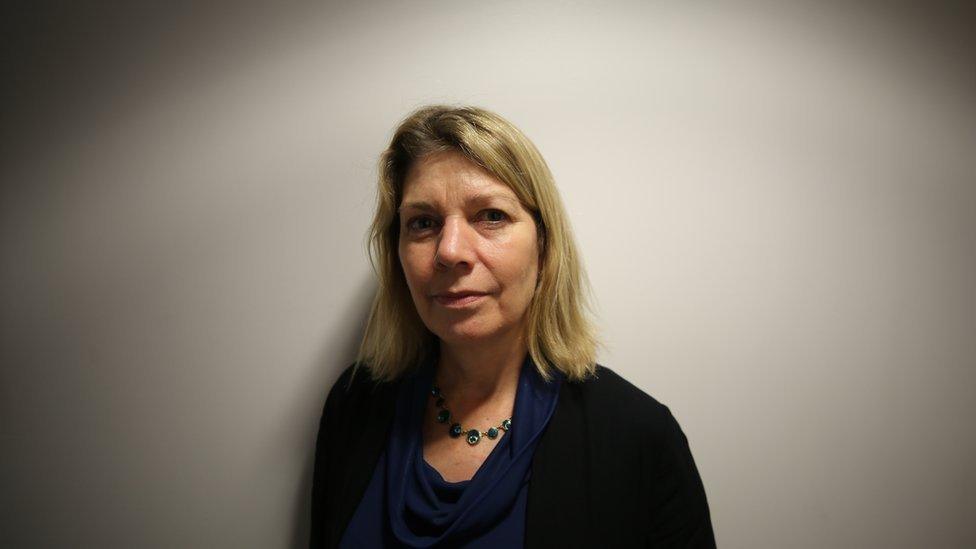Change in strangling law 'would save lives'
- Published

Dr Catherine White, Director of St Mary's Sexual Assault Referral Centre
A change in the law on strangling would save abuse victims' lives, a leading clinician has said.
Dr Catherine White, Director of St Mary's Sexual Assault Referral Centre, explained that one in five sexual assault victims , externalis strangled by their partner.
But the current strangling law, external is "not fit for purpose" and prosecution is "very rare", she said.
The Ministry of Justice indicated there are no plans to change the law.
Studies, external have shown that if a victim is strangled by a partner, then they are seven times more likely to be murdered later by that same partner.
Dr White also told The Next Episode, external podcast that she believes that the authorities - including police and doctors - have "not been alert to the dangers of strangulation", and need more training.
In Australia , externaland New Zealand, external, where non-fatal strangulation has become a crime, an increase in charges has been recorded.
Dr White believes a change in the law in England and Wales would lead to "more awareness and more prosecutions".
As Clinical Director of St Mary's, Dr White is in charge of the longest-established and largest centre of its kind, where victims of rape and sexual assault use services which include immediate crisis support and counselling. Last year, she used data gathered by the centre to look at the prevalence , externalof non-fatal strangulation in the UK.
The current law on strangling carries a maximum sentence of life imprisonment. However, according to Dr White's discussions with lawyers and police, prosecution is "very rare". This is because use of this law requires proof that the strangling took place in order to carry out another act of violence, such as rape or assault.
The Next Episode, external podcast understands that perpetrators are usually charged with Common Assault or ABH (Actual Bodily Harm), offences which carry lower sentences - from a fine to five years imprisonment.

Charlie Webster speaks to The Next Episode
Not all experts agree with her recommendation. Charlie Webster, a governmental adviser on domestic abuse, told The Next Episode, external podcast that a change in the strangulation law is not necessarily the right answer.
She believes nothing will change unless the authorities "look at the root cause [and] we educate around healthy relationships". But she agrees that a change in the law could bring increased awareness about domestic assault.
"It can happen to any gender, any sexual orientation, any ethnicity, any class," she said.

St Mary's Sexual Assault Referral Centre
Last year, an estimated two million adults, external experienced domestic abuse, according to the Crime Survey for England and Wales.
The Next Episode, external podcast has spoken to victims who were strangled by their ex-partners.
Sarah* was strangled at her home by her ex-partner and he has received no prison time.
"He put his hand on my neck and he strangled me, just pressing me down against a wall - things were starting to get blurry.
"Strangling was one of the worst situations I ever experienced in my life".
Hannah Kadiyeh, said she also experienced strangling by her ex-partner.
"When you're getting strangled … all points of your life flash before your eyes," she said. "It's like you're drowning."
Ms Kadiyeh now educates young people and women on how to look out for signs of abuse. She believes a change in the law will help how non-fatal strangulation is seen.
"I hope that [the law change] does happen.
"Hopefully, if the law works … [non-fatal strangulation] will be taken more seriously."
Dr White's proposals are not part of the Domestic Abuse Bill , externalcurrently going through parliament.
A Ministry of Justice spokesman said: "Strangulation is a serious crime which, depending on the nature of the offence, can be charged as attempted murder.
"A specific offence of attempting to choke, strangle or suffocate a person is part of the Offences Against the Person Act, while attempted strangulation could also be part of a course of action under the offence of coercive and controlling behaviour."
Dr White's research has already influenced training and practice at organisations including St Mary's Sexual Assault Referral Centre and Greater Manchester Police. But she believes more needs to be done.
A spokesperson from the National Police Chiefs' Council said: "If a victim made a complaint of strangulation, the investigating officer would be expected to seek confirmation from a medical professional. If there are visible signs of bruising, reddening etc. they would take steps to have photographic evidence secured, and possibly DNA swabs to prove contact from an offender."
Mark Radford, Chief Nurse, Health Education England, said: "Specific training to spot signs of strangulation and respond appropriately is an integral and essential part of safeguarding training for all NHS staff, who require it to deal with the public in their jobs."*Her name has been changed to protect her anonymity.
Listen to The Next Episode , externalon BBC Sounds.
If you have been affected by any of the issues raised, support and advice is available via BBC Action Line.